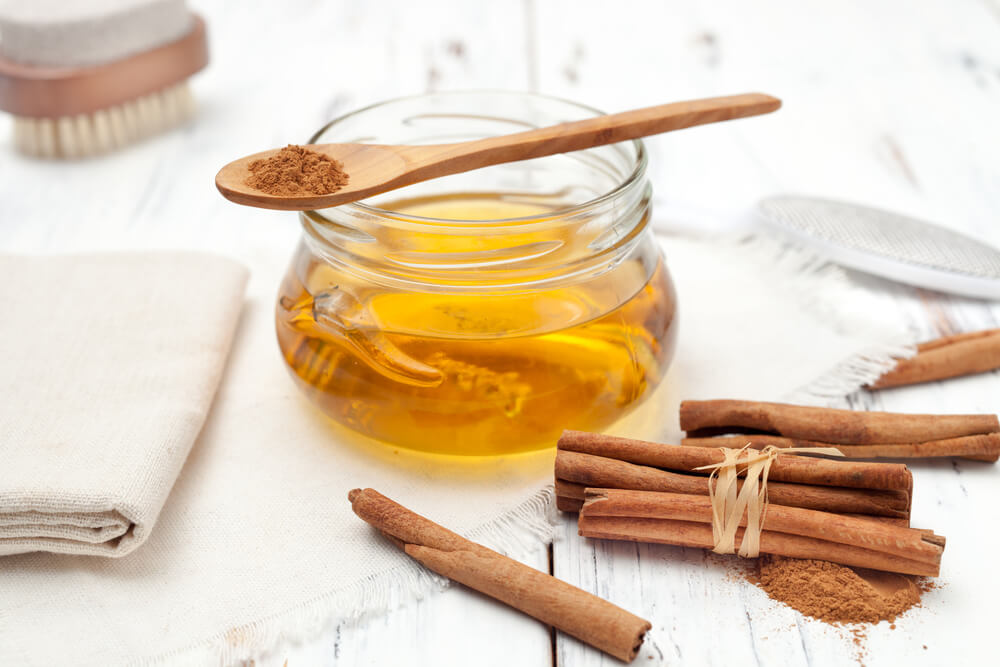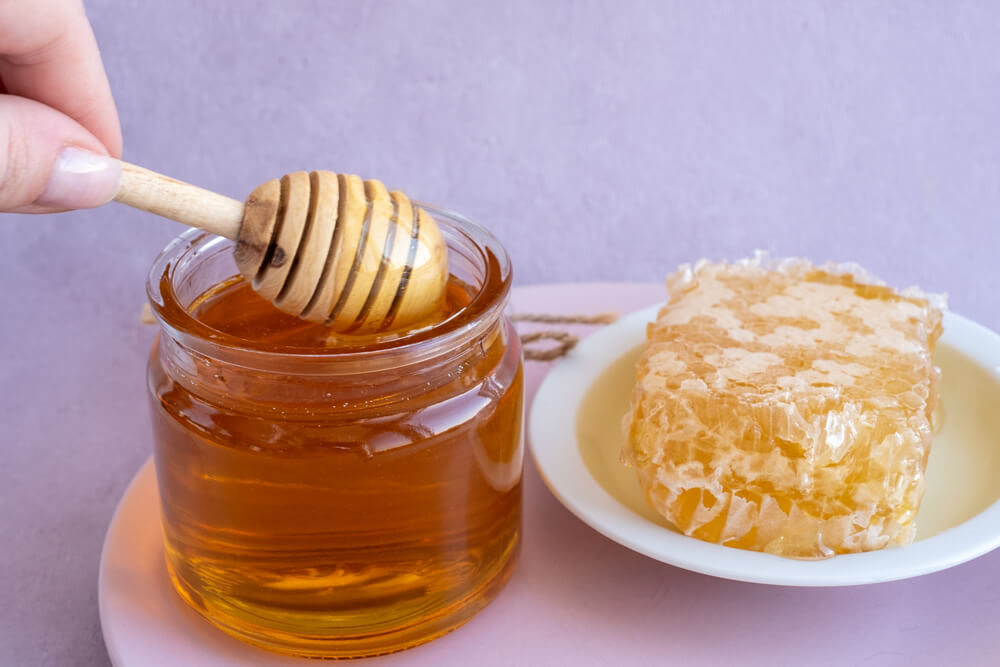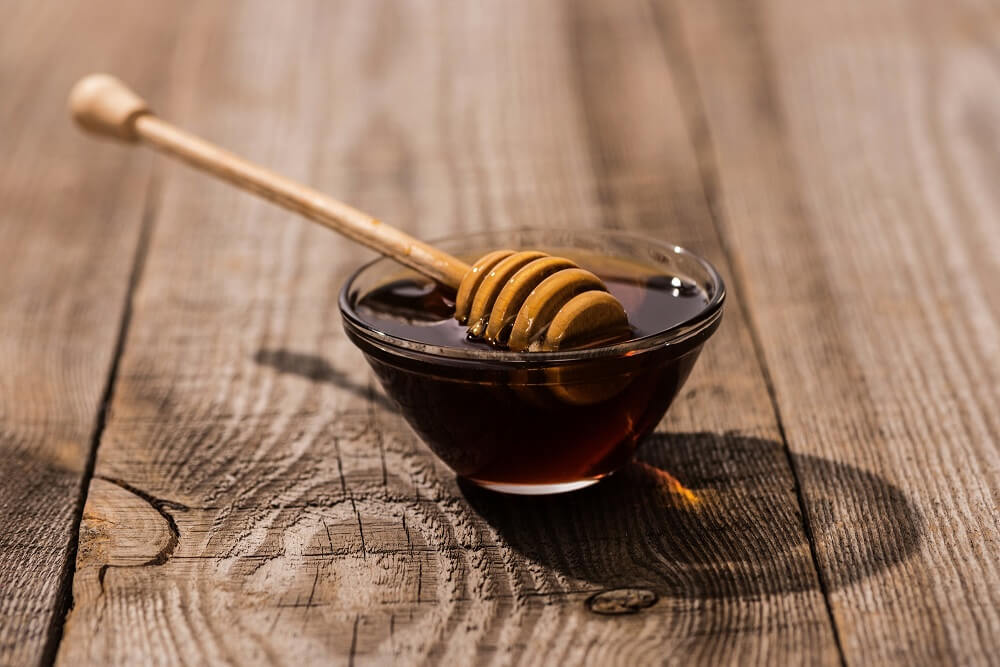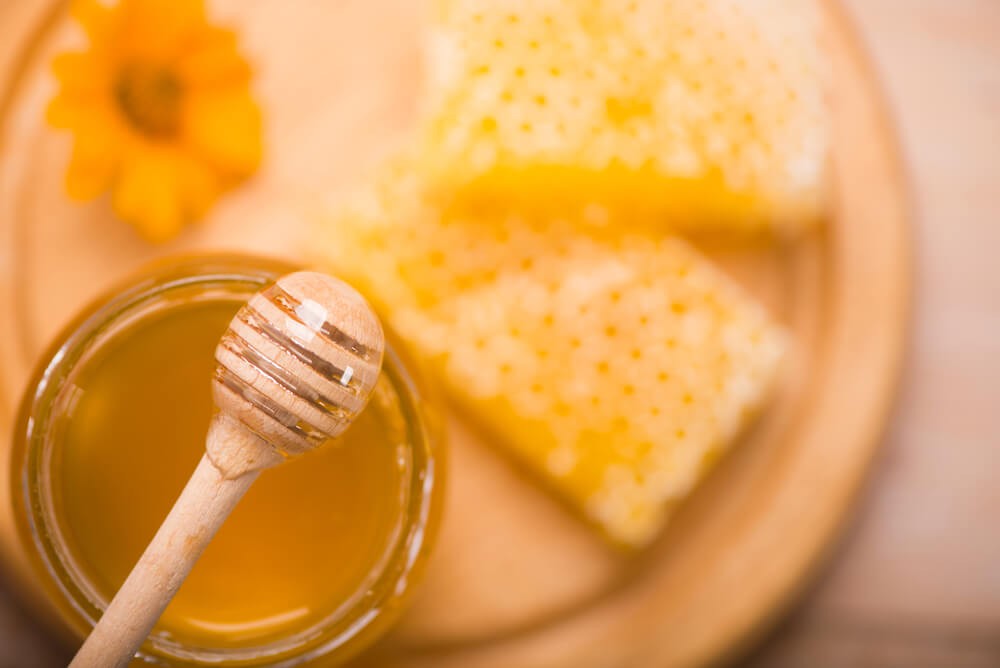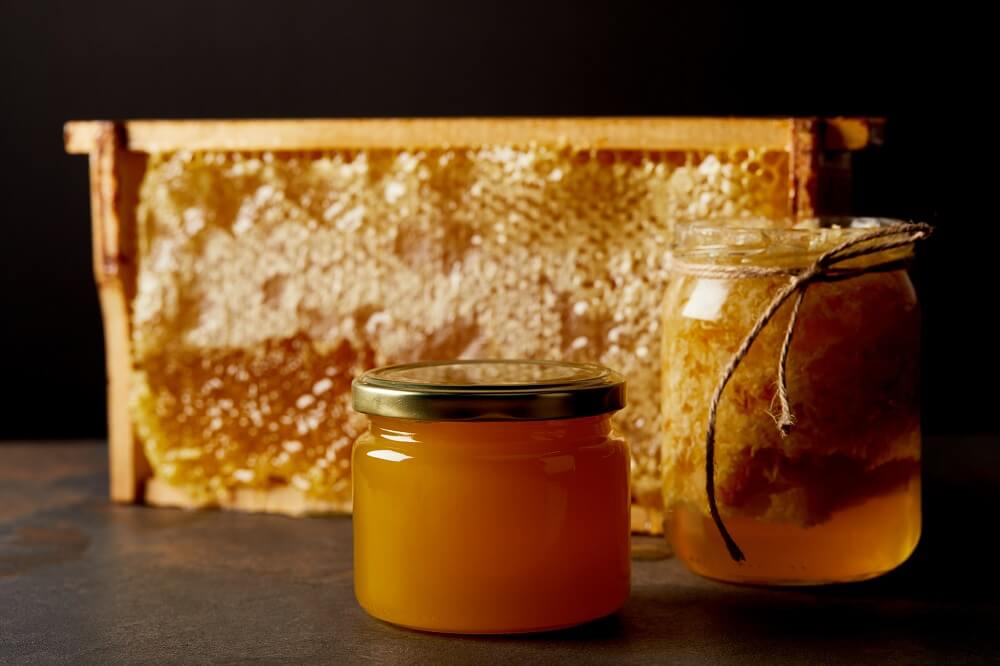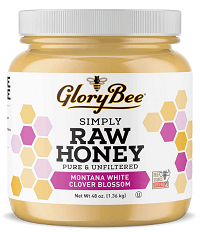Table of Contents:
What Is Cinnamon Honey?
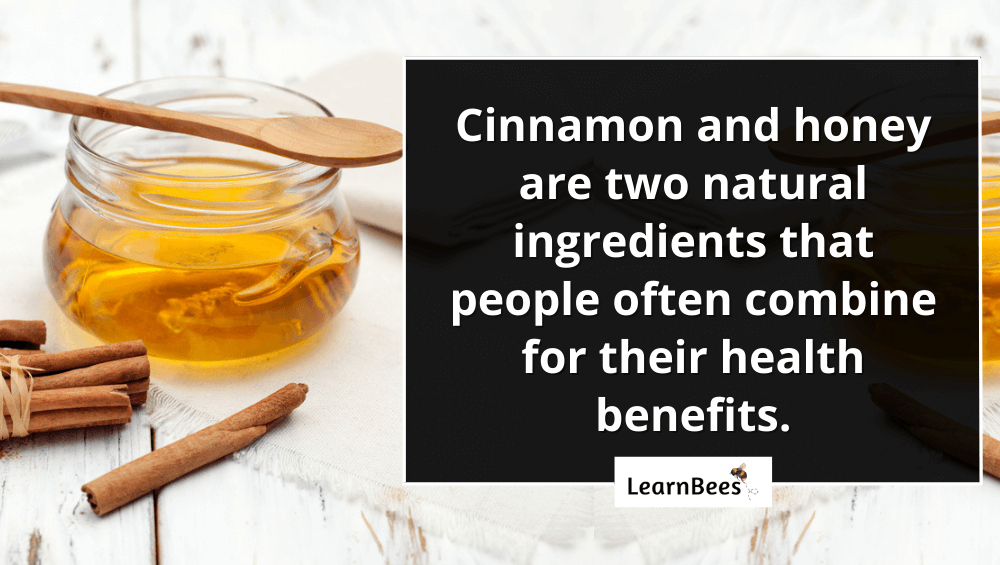
Honey and cinnamon are two natural ingredients that people mix together for their health benefits.
While there’s evidence that both ingredients have some medicinal uses, not all of the claims about cinnamon honey are true.
This article explores the benefits of cinnamon and honey to distinguish between fact and fiction.
So let’s start at the beginning:
What is Cinnamon?
Cinnamon is a spice that comes from the branches of the Cinnamomum tree.
There are two common types of cinnamon:
- Ceylon cinnamon. This kind is considered “true cinnamon” because it’s higher quality and known for its antioxidant content.
- Cassia cinnamon. This type is a lower-quality cinnamon that’s most commonly found in grocery stores.
What is Honey?
Honey is a sweet syrup-like liquid made by honeybees.
Like cinnamon, there are two types of honey:
- Raw honey. This honey hasn’t been heated or processed. Since it’s left in its natural state, it maintains all of the antioxidants and enzymes that provide health benefits.
- Processed honey. This type of honey has been heated, filtered, and sometimes diluted with artificial sweeteners. As a result, the health benefits get removed during processing. This type of honey is most commonly found at grocery stores.
Although both honey and cinnamon have a long list of health benefits, not all of their health claims are true.
What Are the Benefits of Cinnamon and Honey?
If cinnamon and honey are each effective on their own, then many people believe that mixing them will have an amplified effect.
Research has shown that the health benefits of cinnamon and honey are similar. For instance, both are beneficial in the following ways:
Benefit #1: Cinnamon Honey Can Heal Wounds

Ceylon cinnamon and raw honey both have potent anti-inflammatory properties that can help treat wounds and infections when applied to the skin. They’re also antibacterial, which helps accelerate wound healing.(1, 2)
Surprisingly, the use of honey has been successful in treating serious skin conditions, such as diabetes-related foot ulcers. Diabetes-related foot ulcers are serious and can lead to foot amputation. Honey was found to have a 97% success rate in treating such ulcers.(3)
Additionally, cinnamon is known for its strong antibacterial properties. A test-tube study showed that cinnamon oil can defend against antibiotic-resistant bacteria.(4, 5)
With that in mind, this study used cinnamon oil instead of powdered cinnamon. We need more research to determine if powdered cinnamon would have the same effects.
Benefit #2: Cinnamon Honey Contains Important Antioxidants
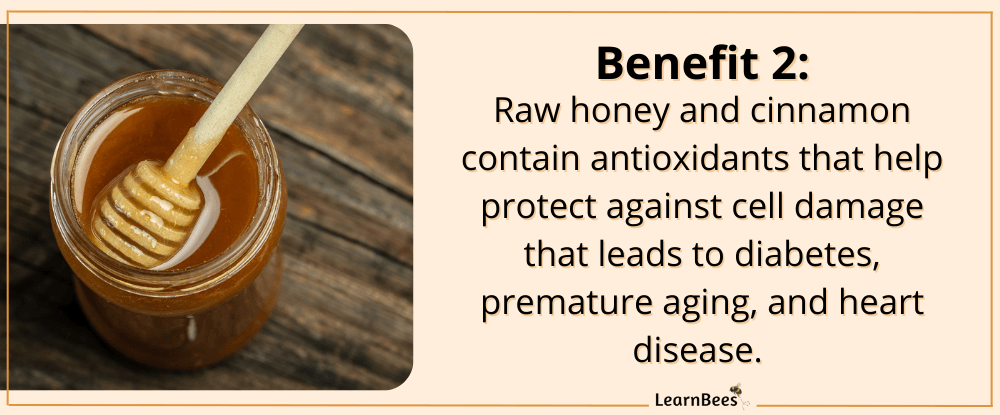
Cinnamon and honey are both valuable sources of antioxidants, which can help protect your cells against free radicals. Free radicals are linked to premature aging and various illnesses and cancers.
Raw honey is packed with phenol antioxidants, which have been linked to decreased blood pressure, improvement in blood fat levels, and regulated heartbeat – all things that improve heart health.(6)
Cinnamon also contains potent antioxidants, such as polyphenols.(7, 8)
In one study, researchers compared the antioxidant content of 26 spices. Cinnamon came in first place, even beating superfoods like oregano and garlic.(9)
Additionally, cinnamon is so powerful that it’s often used as a natural food preservative.(10)
Benefit #3: Cinnamon Honey May Be a Better Sugar Alternative
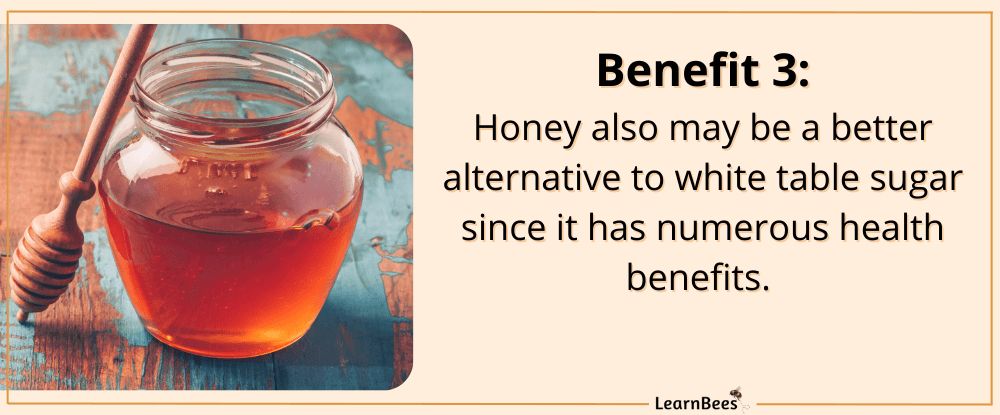
Cinnamon is widely appreciated for its ability to lower blood sugar.
More specifically, cinnamon has been known to decrease the glucose amount that enters your bloodstream after eating. It does so by interfering with several digestive enzymes, which in turn slows the breakdown of carbohydrates
Moreover, a compound found in cinnamon has been shown to mimic insulin. This substantially improves glucose uptake by your cells.(13, 14)
Other studies have shown that cinnamon has anti-diabetic effects, even lowering fasting blood sugar levels by 10-29%.(15, 16, 17)
Additional studies have shown that honey can increase adiponectin levels, a hormone that helps with inflammation and insulin sensitivity.(18)
It’s important to remember that raw honey contains natural sugars that can raise blood sugar levels. With that said, it’s also full of antioxidants that protect against type 2 diabetes and metabolic syndrome.
Sugar has a higher glycemic index (GI) than honey. This means that it causes blood sugar levels to rise faster.
But as with any sweetener, it’s best to eat honey in moderation.
Benefit #4: Cinnamon Honey May Offer Brain Benefits

Neurodegenerative diseases are characterized by the loss of brain cell structure or function.
Parkinson’s disease and Alzheimer’s are two of the most common types.
Two compounds found in cinnamon are believed to inhibit the buildup of tau in the brain, which is a protein that’s one of the hallmarks of Alzheimer’s disease.(19, 20, 21)
In another study, cinnamon helped improve motor function, protect neurons, and normalize neurotransmitter levels in mice with Parkinson’s disease.(22)
Furthermore, the polyphenols in raw honey may help reduce inflammation in the hippocampus, which is the region of the brain involved in memory.
Benefit #5: Cinnamon Honey is a Natural Cough Suppressant
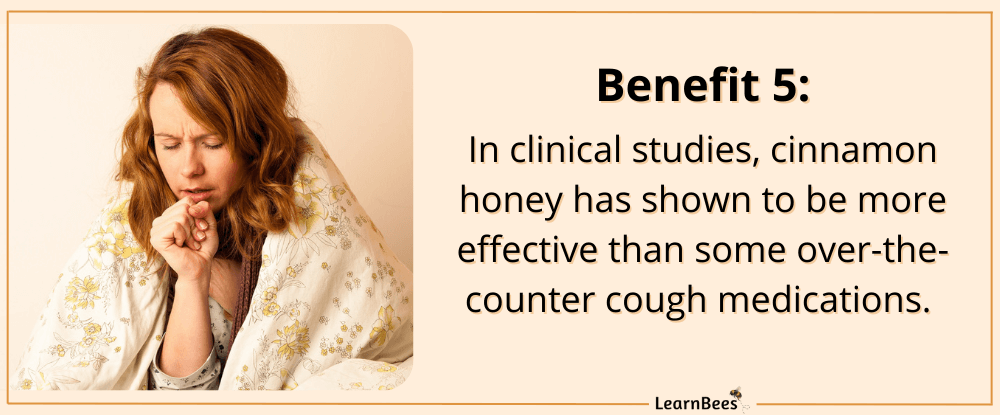
If you’ve ever dealt with an upper respiratory infection, you know how hard it is to sleep while coughing throughout the night.
Honey is more effective at suppressing coughs than dextromethorphan, the active ingredient in most cough medications. More importantly, honey doesn’t contain side effects.(23)
In one study, children with upper respiratory tract infections were given up to 2 teaspoons of honey at bedtime. The honey appeared to help with nighttime coughing as well as improve sleep.
Raw honey is relatively easy to find and inexpensive, with no potential for drug interaction (as may be the case with some over-the-counter medicines).
Almost any adult can use honey to relieve coughing unless the person is allergic to honey.
Additionally, honey should never be given to babies younger than 12 months because of the risk of botulism, a type of food poisoning that attacks the nerves.
How to Use Cinnamon Honey in Your Diet

To understand how honey and cinnamon might benefit your health, it’s important to know the nutritional profile.
One tablespoon of honey contains:
- Calories: 64
- Fat: 0 grams
- Cholesterol: 0 milligrams
- Sodium: 1 milligram
- Carbohydrates: 17 grams
- Fiber: 0 grams
- Sugar: 17 grams
- Protein: 0 grams
One teaspoon of ground cinnamon contains:
- Calories: 6
- Fat: 0 grams
- Cholesterol: 0 milligrams
- Sodium: 0 milligram
- Carbohydrates: 2 grams
- Fiber: 1 gram
- Sugar: 0 grams
- Protein: 0 grams
The best way to use cinnamon honey is to purchase raw honey and Ceylon cinnamon. These two types offer the most health benefits.
But remember:
Honey still contains natural sugars, so use it in moderation. Also, honey should not be given to babies under the age of one because it can lead to infant botulism.
Also, be aware that cinnamon contains coumarin, which is a compound that can be harmful in large amounts. The coumarin compound is more prevalent in Cassia cinnamon (lower quality cinnamon) than Ceylon cinnamon.
It’s best to use Ceylon cinnamon, but if you choose the Cassia type, limit your daily intake to 1/2 teaspoon. You can safely eat up to 1 teaspoon of Ceylon cinnamon daily.
Here are some delicious ways to add cinnamon honey to your diet:
- Add it to oatmeal or yogurt
- Use it as a natural sweetener in smoothies or homemade salad dressings
- Drizzle it over roasted vegetables
- Add it to hot tea or coffee
- Make a honey-cinnamon mask to soothe your skin
FAQs on Cinnamon Honey
- What does cinnamon and honey do?
- Is it good to drink cinnamon and honey?
- When should I drink cinnamon and honey?
- What happens if you eat honey and cinnamon every day?
- Is cinnamon honey good for kidneys?
- Does cinnamon honey reduce belly fat?
- Does cinnamon honey make you poop?
- Does cinnamon honey affect sleep?
- How do you mix honey and cinnamon?
- Does honey and cinnamon work for cough?
What does cinnamon and honey do?
Cinnamon and honey is a popular natural remedy that has many health benefits.
Honey is a natural cough suppressant and can help soothe a sore throat. Cinnamon has anti-inflammatory properties and is a good source of antioxidants.
Together, these two ingredients can help fight infections, improve overall heart health, and reduce inflammation.
—> Go back to the FAQs on cinnamon honey
More to Explore:
- Honey Pasteurization: Does it Ruin Raw Honey?
- Honey for Skin Benefits: Directions, Uses, & Risks
- 8 Scientific Benefits of Raw Honey
Is it good to drink cinnamon and honey?
Yes, both cinnamon and honey are known for their health benefits. Cinnamon can help to regulate blood sugar levels and improve heart health, while honey can help to fight skin infections and soothe a sore throat.
The only people who shouldn’t drink cinnamon honey are people who are allergic and children under one year old, as honey can cause botulism in infants.
Once children are older than one, they can safely drink cinnamon honey in most cases.
—> Go back to the FAQs on cinnamon honey
More to Explore:
When should I drink cinnamon and honey?
You can drink cinnamon honey anytime, morning or night. People suffering from a sore throat tend to drink cinnamon honey an hour or two before bed to ease their symptoms overnight. The honey will coat the throat’s inner lining, providing some relief.
You can also drink cinnamon honey in the morning to help improve digestion and help soothe sore throats throughout the day.
—> Go back to the FAQs on cinnamon honey
More to Explore:
What happens if you eat honey and cinnamon every day?
If you eat honey and cinnamon every day, you may experience some health benefits. For example, honey can help to soothe a sore throat, and cinnamon can help reduce inflammation.
However, it’s important to remember that honey still contains natural sugar, so it’s best to use it in moderation. This is especially important for people with diabetes. Also, honey should not be given to babies under one because it can cause infant botulism.
Besides that, most people can safely eat cinnamon honey daily as long as you aren’t allergic and consume it in moderation.
—> Go back to the FAQs on cinnamon honey
More to Explore:
Is cinnamon honey good for kidneys?
Cinnamon can help regulate blood sugar levels, which may benefit your kidneys.
—> Go back to the FAQs on cinnamon honey
More to Explore:
Does cinnamon honey reduce belly fat? Can you use honey and cinnamon for weight loss?
There is no evidence to suggest that cinnamon and honey are shortcuts for weight loss.
Cinnamon may help regulate blood sugar levels, which could lead to weight loss in some people. However, this is not a guarantee. Additionally, you cannot spot reduce when it comes to fat.
The best way to lose weight is through a healthy diet and exercise.
—> Go back to the FAQs on cinnamon honey
More to Explore:
Does cinnamon honey make you poop?
No, cinnamon honey shouldn’t make you poop. If you are excessively pooping, reduce your cinnamon honey intake or stop consuming it altogether.
Excessive pooping can signify gastrointestinal issues like irritable bowel syndrome (IBS). You may also consider talking to your doctor to determine other possible causes.
—> Go back to the FAQs on cinnamon honey
More to Explore:
- The Top 3 Best Manuka Honey Brands
- Orange Blossom Honey: Uses, Benefits, & Risks
- Sourwood Honey: Uses, Benefits, & Risks
Does cinnamon honey affect sleep?
Cinnamon honey can positively affect your sleep if you suffer from a sore throat or cough. The honey will help coat your throat and provide some relief from symptoms. There is no research to suggest that cinnamon honey negatively affects sleep.
Cinnamon may also help improve sleep quality by reducing inflammation. As a result, honey and cinnamon can reduce coughing duration and prevent sleep disruptions associated with upper respiratory infections.
—> Go back to the FAQs on cinnamon honey
More to Explore:
How do you mix honey and cinnamon?
Remember to eat cinnamon and honey in moderation. For Ceylon cinnamon, do not consume more than one teaspoon per day. For Cassia cinnamon, do not consume more than ½ teaspoon per day.
To mix honey and cinnamon, simply add half a teaspoon of Ceylon cinnamon to a cup of hot water. Then, add a tablespoon of honey and stir until dissolved. You can also add a squeeze of lemon for additional flavor. Drink this mixture either morning or night.
—> Go back to the FAQs on cinnamon honey
More to Explore:
- The Brutally Honest Truth About Sour Honey
- Buckwheat Honey: Uses, Benefits, & Risks
- Can You Eat Honeycombs?
Does honey and cinnamon work for cough?
Honey and cinnamon can work together to help relieve a cough. The honey will help coat the throat, while the cinnamon reduces inflammation. This combination can also help soothe the painful irritation.
To use honey and cinnamon for a cough, mix half a teaspoon of Ceylon cinnamon with a tablespoon of honey. Add this mixture to a cup of hot water and stir until dissolved. Drink once or twice a day as needed.
